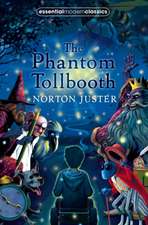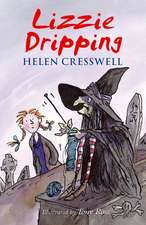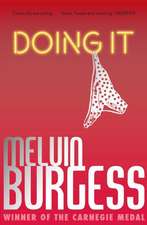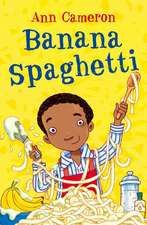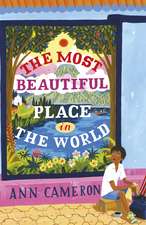Trash
Autor Andy Mulliganen Limba Engleză Paperback – 31 dec 2014
| Toate formatele și edițiile | Preț | Express |
|---|---|---|
| Paperback (3) | 47.25 lei 26-32 zile | +16.16 lei 7-13 zile |
| Random House – 12 iun 2014 | 47.25 lei 26-32 zile | +16.16 lei 7-13 zile |
| Penguin Random House Children's UK – 31 dec 2014 | 47.57 lei 26-32 zile | +16.68 lei 7-13 zile |
| Ember – 30 sep 2011 | 66.16 lei 3-5 săpt. |
Preț: 47.57 lei
Preț vechi: 56.92 lei
-16% Nou
Puncte Express: 71
Preț estimativ în valută:
9.10€ • 9.53$ • 7.53£
9.10€ • 9.53$ • 7.53£
Carte disponibilă
Livrare economică 20-26 martie
Livrare express 01-07 martie pentru 26.67 lei
Preluare comenzi: 021 569.72.76
Specificații
ISBN-13: 9781909531338
ISBN-10: 1909531332
Pagini: 240
Dimensiuni: 131 x 199 x 25 mm
Greutate: 0.18 kg
Ediția:Film Tie-In
Editura: Penguin Random House Children's UK
ISBN-10: 1909531332
Pagini: 240
Dimensiuni: 131 x 199 x 25 mm
Greutate: 0.18 kg
Ediția:Film Tie-In
Editura: Penguin Random House Children's UK
Notă biografică
Andy Mulligan was brought up in South London. He worked as a theater director for ten years before travels in Asia prompted him to retrain as a teacher. He has taught English and drama in Britain, India, Brazil, and the Philippines. He now divides his time between London and Manila.
From the Hardcover edition.
From the Hardcover edition.
Extras
1
My name is Raphael Fernandez and I am a dumpsite boy.
People say to me, 'I guess you just never know what you'll find, sifting through rubbish! Today could be your lucky day.' I say to them, 'Friend, I think I know what I find.' And I know what everyone finds, because I know what we've been finding for all the years I've been working, which is eleven years. It's the one word: stuppa, which means--and I'm sorry if I offend--it's our word for human muck. I don't want to upset anyone, that's not my business here. But there's a lot of things hard to come by in our sweet city, and one of the things too many people don't have is toilets and running water. So when they have to go, they do it where they can. Most of those people live in boxes, and the boxes are stacked up tall and high. So, when you use the toilet, you do it on a piece of paper, and you wrap it up and put it in the trash. The trash bags come together. All over the city, trash bags get loaded onto carts, and from carts onto trucks or even trains--you'd be amazed at how much trash this city makes. Piles and piles of it, and it all ends up here with us. The trucks and trains never stop, and nor do we. Crawl and crawl, and sort and sort.
It's a place they call Behala, and it's rubbish-town. Three years ago it was Smoky Mountain, but Smoky Mountain got so bad they closed it down and shifted us along the road. The piles stack up--and I mean Himalayas: you could climb for ever, and many people do . . . up and down, into the valleys. The mountains go right from the docks to the marshes, one whole long world of steaming trash. I am one of the rubbish boys, picking through the stuff this city throws away.
'But you must find interesting things?' someone said to me. 'Sometimes, no?'
We get visitors, you see. It's mainly foreigners visiting the Mission School, which they set up years ago and just about stays open. I always smile, and I say, 'Sometimes, sir! Sometimes, ma'am!'
What I really mean is, No, never--because what we mainly find is stupp.
'What you got there?' I say to Gardo.
'What d'you think, boy?' says Gardo.
And I know. The interesting parcel that looked like something nice wrapped up? What a surprise! It's stupp, and Gardo's picking his way on, wiping his hands on his shirt and hoping to find something we can sell. All day, sun or rain, over the hills we go.
You want to come see? Well, you can smell Behala long before you see it. It must be about two hundred football pitches big, or maybe a thousand basketball courts--I don't know: it seems to go on for ever. Nor do I know how much of it is stupp, but on a bad day it seems like most of it, and to spend your life wading through it, breathing it, sleeping beside it--well . . . maybe one day you'll find 'something nice'. Oh yes.
Then one day I did.
I was a trash boy since I was old enough to move without help and pick things up. That was what?--three years old, and I was sorting.
Let me tell you what we're looking for.
Plastic, because plastic can be turned into cash, fast--by the kilo. White plastic is best, and that goes in one pile; blue in the next.
Paper, if it's white and clean--that means if we can clean it and dry it. Cardboard also.
Tin cans--anything metal. Glass, if it's a bottle. Cloth or rags of any kind--that means the occasional T-shirt, a pair of pants, a bit of sack that wrapped something up. The kids round here, half the stuff we wear is what we found, but most we pile up, weigh and sell. You should see me, dressed to kill. I wear a pair of hacked-off jeans and a too-big T-shirt that I can roll up onto my head when the sun gets bad. I don't wear shoes--one, because I don't have any, and two, because you need to feel with your feet. The Mission School had a big push on getting us boots, but most of the kids sold them on. The trash is soft, and our feet are hard as hooves.
Rubber is good. Just last week we got a freak delivery of old tyres from somewhere. Snapped up in minutes, they were, the men getting in first and driving us off. A half-good tyre can fetch half a dollar, and a dead tyre holds down the roof of your house. We get the fast food too, and that's a little business in itself. It doesn't come near me and Gardo, it goes down the far end, and about a hundred kids sort out the straws, the cups and the chicken bones. Everything turned, cleaned and bagged up--cycled down to the weighers, weighed and sold. Onto the trucks that take it back to the city, round it goes. On a good day I'll make two hundred pesos. On a bad, maybe fifty? So you live day to day and hope you don't get sick. Your life is the hook you carry, there in your hand, turning the trash.
'What's that you got, Gardo?'
'Stupp. What about you?'
Turn over the paper. 'Stupp.'
I have to say, though: I'm a trash boy with style. I work with Gardo most of the time, and between us we move fast. Some of the little kids and the old people just poke and poke, like everything's got to be turned over--but among the stupp, I can pull out the paper and plastic fast, so I don't do so bad. Gardo's my partner, and we always work together. He looks after me.
From the Hardcover edition.
My name is Raphael Fernandez and I am a dumpsite boy.
People say to me, 'I guess you just never know what you'll find, sifting through rubbish! Today could be your lucky day.' I say to them, 'Friend, I think I know what I find.' And I know what everyone finds, because I know what we've been finding for all the years I've been working, which is eleven years. It's the one word: stuppa, which means--and I'm sorry if I offend--it's our word for human muck. I don't want to upset anyone, that's not my business here. But there's a lot of things hard to come by in our sweet city, and one of the things too many people don't have is toilets and running water. So when they have to go, they do it where they can. Most of those people live in boxes, and the boxes are stacked up tall and high. So, when you use the toilet, you do it on a piece of paper, and you wrap it up and put it in the trash. The trash bags come together. All over the city, trash bags get loaded onto carts, and from carts onto trucks or even trains--you'd be amazed at how much trash this city makes. Piles and piles of it, and it all ends up here with us. The trucks and trains never stop, and nor do we. Crawl and crawl, and sort and sort.
It's a place they call Behala, and it's rubbish-town. Three years ago it was Smoky Mountain, but Smoky Mountain got so bad they closed it down and shifted us along the road. The piles stack up--and I mean Himalayas: you could climb for ever, and many people do . . . up and down, into the valleys. The mountains go right from the docks to the marshes, one whole long world of steaming trash. I am one of the rubbish boys, picking through the stuff this city throws away.
'But you must find interesting things?' someone said to me. 'Sometimes, no?'
We get visitors, you see. It's mainly foreigners visiting the Mission School, which they set up years ago and just about stays open. I always smile, and I say, 'Sometimes, sir! Sometimes, ma'am!'
What I really mean is, No, never--because what we mainly find is stupp.
'What you got there?' I say to Gardo.
'What d'you think, boy?' says Gardo.
And I know. The interesting parcel that looked like something nice wrapped up? What a surprise! It's stupp, and Gardo's picking his way on, wiping his hands on his shirt and hoping to find something we can sell. All day, sun or rain, over the hills we go.
You want to come see? Well, you can smell Behala long before you see it. It must be about two hundred football pitches big, or maybe a thousand basketball courts--I don't know: it seems to go on for ever. Nor do I know how much of it is stupp, but on a bad day it seems like most of it, and to spend your life wading through it, breathing it, sleeping beside it--well . . . maybe one day you'll find 'something nice'. Oh yes.
Then one day I did.
I was a trash boy since I was old enough to move without help and pick things up. That was what?--three years old, and I was sorting.
Let me tell you what we're looking for.
Plastic, because plastic can be turned into cash, fast--by the kilo. White plastic is best, and that goes in one pile; blue in the next.
Paper, if it's white and clean--that means if we can clean it and dry it. Cardboard also.
Tin cans--anything metal. Glass, if it's a bottle. Cloth or rags of any kind--that means the occasional T-shirt, a pair of pants, a bit of sack that wrapped something up. The kids round here, half the stuff we wear is what we found, but most we pile up, weigh and sell. You should see me, dressed to kill. I wear a pair of hacked-off jeans and a too-big T-shirt that I can roll up onto my head when the sun gets bad. I don't wear shoes--one, because I don't have any, and two, because you need to feel with your feet. The Mission School had a big push on getting us boots, but most of the kids sold them on. The trash is soft, and our feet are hard as hooves.
Rubber is good. Just last week we got a freak delivery of old tyres from somewhere. Snapped up in minutes, they were, the men getting in first and driving us off. A half-good tyre can fetch half a dollar, and a dead tyre holds down the roof of your house. We get the fast food too, and that's a little business in itself. It doesn't come near me and Gardo, it goes down the far end, and about a hundred kids sort out the straws, the cups and the chicken bones. Everything turned, cleaned and bagged up--cycled down to the weighers, weighed and sold. Onto the trucks that take it back to the city, round it goes. On a good day I'll make two hundred pesos. On a bad, maybe fifty? So you live day to day and hope you don't get sick. Your life is the hook you carry, there in your hand, turning the trash.
'What's that you got, Gardo?'
'Stupp. What about you?'
Turn over the paper. 'Stupp.'
I have to say, though: I'm a trash boy with style. I work with Gardo most of the time, and between us we move fast. Some of the little kids and the old people just poke and poke, like everything's got to be turned over--but among the stupp, I can pull out the paper and plastic fast, so I don't do so bad. Gardo's my partner, and we always work together. He looks after me.
From the Hardcover edition.
Recenzii
“Trash is a compelling read. The action is riveting and the secret codes throughout will appeal mystery fans” - School Library Journal, starred review
“This gripping book engages readers both as an adventure and as a social justice story. Readers will be satisfied by the cinematic conclusion and the noble decision the heroes make.” - Publishers Weekly, starred review
"The three boys, and others, act as alternating narrators of the story, giving vivid descriptions of their lives. In spite of this, the boys’ hope and determination for justice and the dilemmas they face with so much courage will impress readers. Recommended." - Library Media Connection
From the Hardcover edition.
“This gripping book engages readers both as an adventure and as a social justice story. Readers will be satisfied by the cinematic conclusion and the noble decision the heroes make.” - Publishers Weekly, starred review
"The three boys, and others, act as alternating narrators of the story, giving vivid descriptions of their lives. In spite of this, the boys’ hope and determination for justice and the dilemmas they face with so much courage will impress readers. Recommended." - Library Media Connection
From the Hardcover edition.

